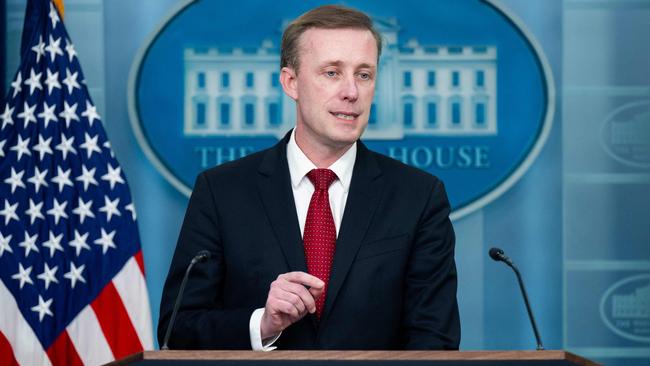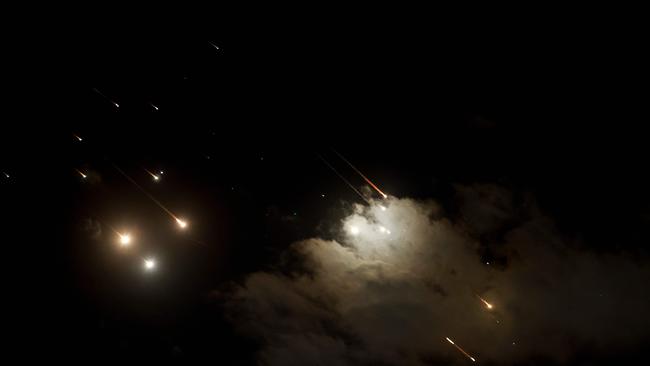US unveils sanctions aimed at ghost fleets
The White House is trying to persuade Israel not to carry out military strikes against Iran’s oil infrastructure or nuclear sites.

The Biden administration is tightening sanctions on Iran in response to Tehran’s large-scale ballistic missile attack on Israel earlier this month.
The move at the weekend comes as the White House is trying to persuade Israel not to carry out military strikes against Iran’s nuclear sites and oil infrastructure, which US officials fear could spark a wider conflict in the region and drive up oil prices.
National Security Adviser Jake Sullivan said on Friday (Saturday AEDT) the new steps included measures against the “ghost fleet”, the shipping companies that help Iran illicitly smuggle oil around the world.
“These measures will help further deny Iran financial resources used to support its missile programs and provide support for terrorist groups that threaten the US, its allies, and partners,” Mr Sullivan said.
Roughly 90 per cent of Iranian exports go to China. To evade existing sanctions, some traders have transported Iranian oil to China and other destinations using companies based in Malaysia, China, India, and the United Arab Emirates. The US on Friday said it had identified 23 vessels that had helped transport Iranian crude and was taking action against them.
About 15 per cent of China’s oil imports come from Iran.
The new steps come as Israeli Prime Minister Benjamin Netanyahu and US President Joe Biden, along with their aides, have been holding talks about Israel’s plans to retaliate militarily against Iran for its October 1 attack that involved more than 180 ballistic missiles. Mr Biden said last week he wanted Israel to avoid strikes against Iran’s oil fields.
“Our strike will be lethal, precise and, above all, surprising. They won’t understand what happened and how. They will see the results,” Israeli Defence Minister Yoav Gallant said during a speech on Wednesday to troops.
“Whoever strikes us will be harmed and pay a price.”
US officials fear a strike against Iranian facilities could prompt Tehran to respond by striking oilfields in Saudi Arabia and possibly force the US to become involved militarily.
Tehran has warned Arab countries it could retaliate against Arab nations that let Israel use their airspace to strike targets in Iran. That has spurred concerns in Persian Gulf states that their oil infrastructure could be in danger.

The sanctions announcement came on the same day the administration approved more than $US1bn ($1.48bn) worth of new arms sales for Saudi Arabia and UAE, two of its closest Persian Gulf allies.
The weapons packages include two types of surface-to-surface missiles to the UAE – Army Tactical Missile Systems, or ATACMS, and Guided Multiple Launch Rocket Systems, or GMLRS – as well as logistics support, worth more than $US1.4bn, according to the State Department. The US also announced nearly $US252m worth of AIM-9X Block II Sidewinder missiles, which are shorter-range air-to-air missiles, and $US139m worth of ammunition to Saudi Arabia.
Politicians from both parties have in recent months pressed the White House to toughen sanctions on Iran’s oil exports, saying Iran was accumulating revenue through illicit sales.
“Existing sanctions must be more effectively enforced in order to promptly secure an end to Iran’s ability to circumvent these trade restrictions. Otherwise, Iran will continue to use its oil revenues to provide material support to its terrorist proxies,” four members of the House of Representatives wrote to Mr Biden in a September letter.
Senator Dan Sullivan, an Alaska Republican, on Friday said the new sanctions still fell short of the measures taken during the Trump administration. “I have relentlessly pressed President Biden and his team to reimpose the Trump-era sanctions. Unfortunately, today’s announcement misses the mark, particularly because Chinese ports, buyers and refineries, which purchase about 90 per cent of Iran’s oil exports, are still not sufficiently targeted with sanctions,” he said.
Iran pumped about 3.3 million barrels of oil a day in the second quarter, according to the US Energy Information Administration. Ship-tracking firms and traders say the country often exports half or more of that output, despite existing US sanctions.
A huge portion of the Islamic Republic’s shipments abroad run through a massive terminal on Kharg Island in the Persian Gulf, used by oil tankers to ferry supplies to refineries in Asia and elsewhere.
The White House hinted at the sanctions package earlier this month after the Iranian attack.
The Wall Street Journal


